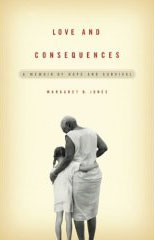 With the recent discovery that yet another memoir to hit the bookshelves was entirely fabricated, the latest being “Love and Consequences”–the Margaret A. Jones tall tale of being raised by a gang-banging foster family which led to her life of drug-running–it seems that a new literary trend is upon us, one signaling that we are no longer safe in the non-fiction aisles of our bookstores.
With the recent discovery that yet another memoir to hit the bookshelves was entirely fabricated, the latest being “Love and Consequences”–the Margaret A. Jones tall tale of being raised by a gang-banging foster family which led to her life of drug-running–it seems that a new literary trend is upon us, one signaling that we are no longer safe in the non-fiction aisles of our bookstores.
Who’s to blame here and just whose head should grace the platter when the morality lynch mobs return from a hard day’s search for the Truth? Should it be the fibbing author? Or the publishers who are failing to fact-check whether page two actually follows page one?
Perhaps Oprah should just add another network to her empire, this one devoted to the constant chastising of white-lie writers like when she turned her Chicago studio into the world’s best-lit principal’s office for her tele-flogging of James Frey.
Everyone seems so bent out of shape about this recent spate of fabled memoirs, but I think I have a solution. The publishing industry simply needs to come up with a new genre for the faux memoir…we’ll call it the faumoir! It sounds French (read: classy) and full of joie de vivre yet with a provocative dose of oh la la. Think of the all fun suburbia will have displaying their latest faumoir next to the armoire in the boudoir. Everyone make way for Peoria chic!
I’m sure I’ll be taken to task for this, but are these literary delusions really cause for such “sky is falling” hysteria? People change stories all the time. They embellish dialogue or amend details to make a story more dramatic. I, for one, am absolutely horrible at remembering dialogue verbatim. I’ve often been known to look quizzingly at my partner in conversation right after they’ve responded to me and ask, “I’m sorry, what did I just say?”
Margaret A. Jones, whose real name is Margaret Seltzer, said in a tear-stained, apologetic telephone interview with the New York Times that she based the story for “Love and Consequences” on people she has known and met over the years…that she wanted to give voice to people who would not otherwise be heard. She has a point.
I contend that there’s a finer line between fact and fiction than most people would like to admit so can’t we all be adults about the relativity of truth, be it in politics, reality TV, religious history or in any big business (in this case, publishing)? I’m not defending Miss Seltzer’s choice to misrepresent herself, but I don’t need her tear-filled confession. I’m neither her parent nor her priest. She could’ve said, “I’m a middle-class white woman with the education and connections to actually get this story told…and told well…could you blame me?”
Even if it’s not her story, it’s someone’s story, so why can’t we still judge it with the same literary merit as we would any non-fiction work or novel? If her now-recalled book inspired someone to give to a charity or devote time to helping those affected by senseless gang violence…or even helped a reader simply connect to another human being, can that ever be taken away? WWJSay?
This trend is nothing new as Motoko Rich makes crystal clear in his follow-up piece in the New York Times about the long history of the faumoir. (If I keep writing it, perhaps it’ll really catch on.)
In the end, for those of us taught not to believe everything we hear and only half of what we read, we’re ahead of the learning curve yet again. Thanks, Mom, for that sound advice. Literally.


